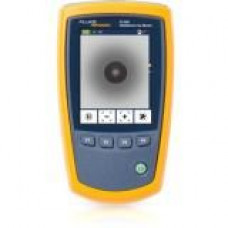Shopping Cart
0 item(s) - $0.00- Accortec, Inc.
- Addon Tech
- Advantech Co., Ltd
- Axiom
- BLACKBOX
- C2g
- Chief Manufacturing
- Cisco
- Dell
- EATON
- EMC
- Enet Components, Inc.
- Fortinet
- Getac, Inc
- HP
- HPE
- IBM
- Intel
- Legrand Group
- Lenovo
- Lexmark
- Middle Atlantic Products, Inc
- Monoprice, Inc
- National Products, Inc
- Panduit Corp
- StarTech.com
- Supermicro
- TDK
- Tripp Lite
- Veritas Technologies Llc
Fluke Networks FI-500 FiberInspector Micro - Cable Fault Testing - USB - Optical Fiber - 2Number of Batteries Supported - Battery Rechargeable - Nickel Metal Hydride (NiMH) FI-500
Add to Compare
Dirty fiber optic endfaces are the major cause of problems in singlemode and multimode fiber optic systems. The FI-500 FiberInspector™ Micro removes the hassle associated with inspecting fiber end faces, especially in low light and high cable density situations. It is very simple to use: Simply plug the cable into the FI-500 and touch the AF button. Within seconds, the fiber endface comes into sharp, clear view. And if you''re working in a difficult to reach place or you can''t get the image to stand still, just touch the pause button to freeze the image. PortBright™ illumination to see ports in dark and dense panels Autofocus for stable images in a few seconds Large display to view single mode and multimode fiber end faces Includes 4 UPC tips (LC, SC, 1.25 mm and 2.50 mm). APC tips available Today''s high density fiber patch panels make inspection a challenge. Finding the cable or port to test can be tough, especially in the low light conditions found in most data centers and wiring closets. The FI-500 is designed to simplify the inspection process. The built-in PortBright flashlight helps you find the right port or cable. The small-profile probe fits into tight spots, and features pushbutton controls for simple operation. Autofocus provides a sharp view of the endface in a few seconds, while the pause button freezes the image on the crisp 320 x 240 display for more detailed inspection. The FI-500 FiberInspector Micro fills the gap between a manual scope and a fully automated inspection scope. The FI-500 has the simplicity and practicality of a manual inspection scope, but with advanced features to reduce troubleshooting and inspection time. Manual fiber inspection scopes are simple to use, but they don''t work well on patch panels or situations where there is a high density of fiber. Holding it up to one eye and closing your other eye is often inconvenient or impractical, especially in a dark room. Fully automatic inspection scopes analyze and grade the cleanliness of fiber connections which is important for many applications, but analysis is usually not needed for quick basic troubleshooting.
Technical Specifications:
Device Function: Cable Fault TestingUSB: YesMedia Type Supported: Optical FiberNumber of Batteries Supported: 2Battery Rechargeable: YesBattery Chemistry: Nickel Metal Hydride (NiMH)Input Voltage: 6 V DCHeight: 5.5"Width: 3.2"Depth: 1.5"Weight (Approximate): 9.70 ozPackage Contents:
- FI-500 FiberInspector Micro, 4 x UPC tips; SC, LC, 1.25 mm and 2.50 mm
Write a review
Your Name:Your Review: Note: HTML is not translated!
Rating: Bad Good
Enter the code in the box below:


